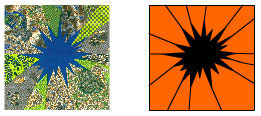New ideas for the Dutch soccer shirt
"Space is the unique defining element of Dutch football. Other nations and football cultures may have produced
greater goalscorers, more dazzling individual ball-artists and more dependable and efficient tournament-winning teams.
But no one has ever imagined or structured their play as abstractly, as architecturally, in such a measured fashion
as the Dutch."
(A quote about the Dutch football system from the 70's from the book 'Brilliant Orange' by David Winner)
Ideas not design.
In the 70's the Dutch soccer got famous with its idea of playing 'football total'.
In the 80's the influence of the Surinamese players brought success and the Dutch team won the Euro 88.
In the 90's the penalty trauma shocked the Dutch supporters.
What should be represented in a shirt ?
The emotions of the player
The emotions of the players change constantly during a game. Is it possible to make this visible on the shirt ?
The level of excitement is reflected in the jersey's color adding another dimension to the visual landscape of the game,
allowing spectators to 'read' the match in another way.

pulse frequency index
050 - warm up, national song
100 - average play
150 - short sprint, duel
200 - goal, right after a penalty
The supporters influence
Beside the players, the supporters influence the atmosphere during a game. They act in relation to the team
and wear the same colours and sports kits.
Supporters are frequently related to as the 12th player.
As they are part of the team they could be involved in the shirt design.
The influence of the supporters can be connected to different elements of the shirt. If the fans are enthusiastic about the
game items appear on the jersey. In this example, the two stripes of the famous shirt of Johan Cruijff from 1974.

The multicultural background of a national team
As an idea for a new Dutch national shirt we propose to develop (preferably with Vlisco) a pattern connected to a proverb
that refers to the identity of the team and it's attitude. Patterned shirts could then be designed for special occasions /
games like qualification, memorial, finals and friendly games.
The Dutch company Vlisco industrialized the batik process to design fabrics in the beginning of the 19th century. Now this
Dutch company exports textiles for the African market under the name "Dutch-Wax" and is very popular. Some of their
patterns became so popular that after a while they were given names by the market or users. These names are symbolic and
refer to an imagined power attached to the cloth. In some cases the factory produces special runs on request,
to commemorate holidays, elections or other political events.
